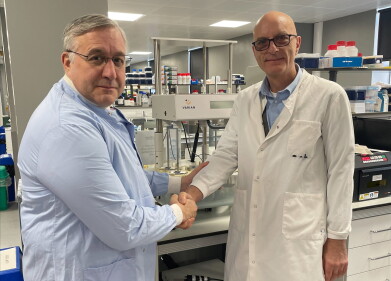News
Insights into Fighting Bacterial Infection
Aug 09 2016
A team of researchers led by Dr Norihito Kawasaki from the Institute of Food Research has found a novel way in which certain bacteria are recognised and trigger our immune system. They have been investigating the role of lipopolysaccharides, molecules made up of a fatty lipid section attached to a sugary polysaccharide part. Found on the outer surface of a large group of bacteria, they play a key role in protecting the bacteria; but they also give away their identity to molecules that play a role in our immune defence.
Using a combination of techniques involving isolated immune cells, the research showed that the polysaccharide part of the LPS can be recognised by proteins from the host called lectins. Lectins are proteins that bind to specific polysaccharides, and play important roles in a number of different processes, including in modulating the immune system.
Specific lectins bind to the LPS, and this leads to an enhanced immune response over that which is seen when there is no connection between lectins and the LPS polysaccharide. This brings a level of specificity to the response based on the sugar chemistry displayed on the bacteria’s surface proteins.
“This helps us understand what happens when bacterial infections occur, and how our bodies fight against infection” said Dr Kawasaki.
As well as helping us understand these fundamental infection processes, the new insights into these mechanisms might help in the design of vaccine adjuvants that increase the efficacy of vaccinations.
The Institute of Food Research is strategically funded by the Biotechnology and Biological Sciences Research Council (BBSRC), who funded the research along with a Marie-Curie Incoming Fellowship award from the EU 7th Framework Programme to Dr Kawasaki.
Reference: Wittmann, A., Lamprinaki, D., Bowles, K.M., Katzenellenbogen, E., Knirel, Y.A., Whitfield, C., Nishimura, T., Matsumoto, N., Yamamoto, K., Iwakura, Y., Saijo, S., and Kawasaki, N. Dectin-2 Recognises Mannosylated O-antigens of Human Opportunistic Pathogens and Augments Lipopolysaccharide Activation of Myeloid Cells, Journal of Biological Chemistry doi: 10.1074/jbc.M116.741256
Digital Edition
ILM 50.2 March 2025
March 2025
Chromatography Articles - Effects of small deviations in flow rate on GPC/SEC results Mass Spectrometry & Spectroscopy Articles - Waiting for the present to catch up to the future: A bette...
View all digital editions
Events
Mar 17 2025 Milan, Italy
Mar 18 2025 Beijing, China
Mar 20 2025 Brussels, Belgium
Mar 20 2025 Chandigarh, India
ACS National Meeting & Expo, Spring 2025
Mar 23 2025 San Diego, CA, USA



















